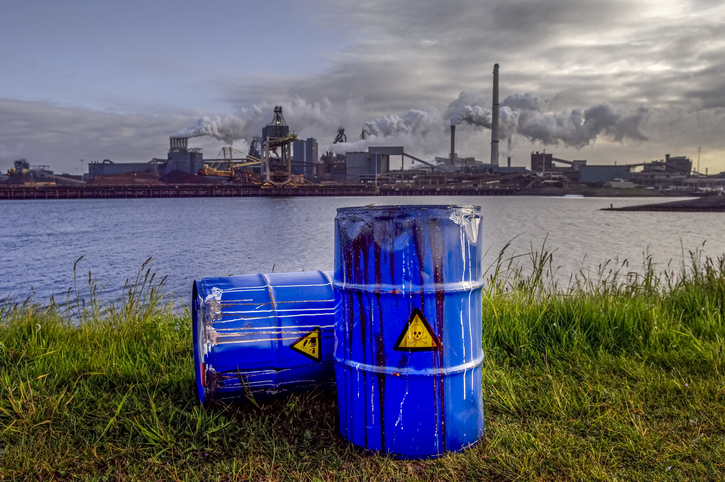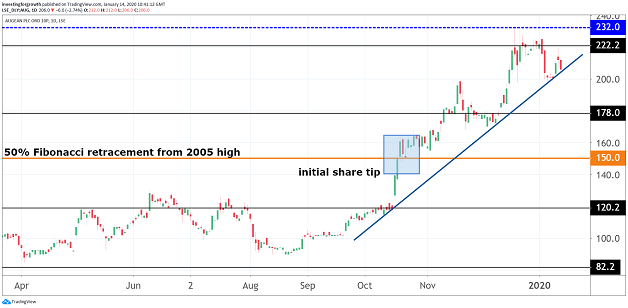Stockwatch: A successful share tip still undervalued
With a 37% return already, the risk/reward profile remains attractive and the shares modestly rated.
14th January 2020 10:54
by Edmond Jackson from interactive investor
With a 37% return already, the risk/reward profile remains attractive and the shares modestly rated.

The £220 million specialist in hazardous waste Augean (LSE:AUG) has affirmed strengths in a pre-close update, citing 2019 normalised pre-tax profit “at least in line” with October’s upgrade in the consensus from £16.5 million for £18.4 million.
That sounds plenty confident, though not higher than expectations; management being wise not to over-egg guidance after a recent upgrade. It catches my attention less for precise figures than a corporate trend of underlying momentum and upgrades.
From 210p, the stock opened at around 220p but drifted back to 212p, as if demand-supply is currently in equilibrium, the price having risen 48% since I rated Augean a “buy” last October at 152p. While a near-term “hold” stance may be appropriate, it looks like things are now coming together such that the stock remains a “buy” on a multi-year view.

Source: TradingView Past performance is not a guide to future performance
Key financials remain attractive despite the re-rating
Based on recent consensus for earnings per share (EPS) of about 15p for 2019, rising to near18p this year, earnings growth should be over 50% on 2018 moderating (on current guidance) to at least 20% in 2020.
With the forward price/earnings (PE) multiple reducing from 14x (in respect of 2019) to below 12x, the current price/earnings-to-growth (PEG) ratio is 0.6, which is attractive in growth stock terms. Mind, it is a snapshot in time and there have been no dividends since 2016 due to a dispute with HMRC over landfill tax.
More positively, the table shows the cashflow profile has strongly improved, and the last interim cashflow statement reveals how £13.9 million was generated from operations versus £2.3 million investment needs, covered anyway by £3.4 million proceeds from a business sale.
So, although £28 million balance sheet cash (as of last November) is going out to settle £40.4 million due to HMRC, helped also by a new £20 million bank facility, it looks as if near-term debt could be limited to around £10 million. As cash rebuilds, net debt could come down to zero and dividends recommence.
Return on capital employed (net assets minus net cash and net debt) more than doubled in the first half-year on a like-for like basis from 18.7% to 44.2%. So, although end-June net tangible assets per share were 46p, and patience looks needed for dividends while Augean continues to contest HMRC via the tax tribunal system, there is a financial “prop” of sorts. So, the risk/reward profile remains attractive on the basis the operations’ story continues strongly.
| Augean - financial summary | ||||||
|---|---|---|---|---|---|---|
| year and 31 Dec | 2013 | 2014 | 2015 | 2016 | 2017 | 2018 |
| Turnover (£ million) | 43.5 | 55.0 | 61.0 | 76.0 | 67.0 | 79.7 |
| Operating margin (%) | 11.2 | 12.2 | 5.4 | 2.7 | 8.1 | 14.2 |
| Operating profit (£m) | 4.9 | 6.7 | 3.3 | 2.1 | 5.4 | 11.3 |
| Net profit (£m) | -1.8 | 4.9 | 1.6 | 0.4 | -3.5 | 9.9 |
| IFRS3 earnings/share (p) | 3.1 | 4.5 | 1.6 | 0.4 | 3.9 | 8.2 |
| Normalised earnings/share (p) | 3.3 | 4.0 | 5.3 | 7.4 | 5.6 | 8.5 |
| Operating cashflow/share (p) | 4.9 | 7.9 | 10.0 | 10.8 | 9.2 | 15.4 |
| Capital expenditure/share (p) | 7.1 | 6.7 | 7.2 | 8.1 | 8.6 | 3.3 |
| Free cashflow/share (p) | -2.1 | 1.1 | 2.9 | 2.7 | 0.6 | 12.1 |
| Dividend/share (p) | 0.35 | 0.50 | 0.65 | 1.0 | ||
| Covered by earnings (x) | 8.9 | 9.0 | 2.4 | 0.4 | ||
| Net Debt (£m) | 8.5 | 5.7 | 4.3 | 10.8 | 10.8 | -8.2 |
| Net assets per share (p) | 47.3 | 51.8 | 53.2 | 53.1 | 48.7 | 58.1 |
| Source: historic Company REFS and company accounts |
Sense for serial upgrades is being affirmed
The likelihood of further upgrades was part of my rationale last October after a bullish update for the third quarter cited full-year profit due “materially ahead” of consensus, then for £16.5 million adjusted pre-tax profit.
Augean was enjoying a 20% increase in landfill volumes across all waste types, such that demand apparently helped a further 20% rise in landfill pricing. While I’m unsure of the exact drivers behind more volumes in this frankly contentious activity, that it includes disposal from construction and industrial sites rather ties it to economic activity – where a key aspect of Brexit uncertainty is now resolved. Similarly, October’s update had cited higher radioactive waste profit and good performance by the treatment also North Sea businesses.
So, positives across the portfolio conflated, and Augean capitalised on them after its cost savings programme had considerably beaten targets. Quite what extent this involved luck is unclear, but (global) macro risks may be easing. The chief medium-term risk looks to be economic slowdown if UK trade talks with the European Union disappoint, despite Conservative claims that “Brexit will be done” on 31st January.
- Can this stunning AIM share avoid hazards?
- Take control of your retirement planning with our award-winning, low-cost Self-Invested Personal Pension (SIPP)
July’s interims had shown revenue pre-landfill tax up 40% to £33.2 million and adjusted EPS up 114% to 7.6p – versus forecasts of 12.1p for 2019, up from 8.5p last year. This has since upgraded to 14.6p based on £15.6 million net profit, then 17.8p in the current 2020 year.
While it can be hard to get a grip on medium-term trends in hazardous waste, that Augean’s board has opted to draw a line under the HMRC affair (deploying cash and raising modest debt) appears to reflect confidence in prospects.
A compromise looks to have been struck with HMRC
It’s a somewhat mixed upshot for the landfill tax case versus HMRC. Last month, Augean said it had paid all outstanding disputed tax plus interest accrued, citing £40.4 million over a two-year period. I’ve previously noted to beware of “profit before landfill tax” (as if it should be normalised thus) and scope for earnings variation according to what taxation basis is finally agreed.
Although management appeared to take some credit for getting the tax liability down by £4.6 million, this was as a result of HMRC withdrawing penalties notices. It reads as if a compromise was struck, albeit with Augean “paying all HMRC assessments received, in full” to stop any further accrual of interest should HMRC win its case.
“The group continues to robustly challenge the landfill tax assessments through the tax tribunal system,” it said. So, this needs watching in terms of upshot for net profitability. At least the board has cleared the issue of accumulating interest due, which was damaging to shareholder value, the recent share price response underlining this as a positive move to clear the air.
LTIP payout is also currently swallowing cash
A long-term cash-based incentive plan (LTIP) for management also vested last month, giving rise to a £7 million payment as the stock had risen from 35p since the scheme’s introduction in August 2018 to near 180p.
The board justified this on the grounds of representing just 4.7% of the increase in shareholder value over that period. However, they were referring to market value in a context where the stock had anyway fallen from a 40-65p range in the previous two years and from nearly 270p in early 2005. Arguably, intrinsic value is the real benchmark, albeit subjective to assess, hence resorting to the stock price.
The five-year chart looks to demonstrate highly creditable growth, although genuine long-term investors will see it as a trough, given the stock fell from 270p in 2005 - de-rating even before the 2008 financial crash. It didn’t have support from dividends until 2013, although contemporary cash generation versus capital expenditure needs to make this possible.
40% UK market share in hazardous waste treatment/landfill
Recovery in shareholder value effectively goes back to a CEO change in 2013, since when Augean has repositioned towards trickier yet growing areas such as energy waste, construction/demolition projects and nuclear/oil & gas decommissioning, which offer higher growth and margins.
Earnings quality arises from such areas being strongly regulated and Augean enjoying a circa 40% UK market share.
A possible ongoing risk is private industry profits growth leading to calls for higher landfill taxes. This is at least mitigated by a strong majority Conservative government than Labour, although Boris Johnson has big spending plans and wants to be seen as environmentally friendly.
Meanwhile, last October Augean was granted an option to acquire 90 acres of land adjacent to its Peterborough facility, currently generating over £8 million operating profit annually and which would extend the facility’s life to 2040. Being a key asset in terms of fulfilling Southern England’s need for hazardous landfill and soil treatment, government will need to allow private industry to flourish.
Short-term “hold” albeit longer-term “buy”
While traders seem in equilibrium after a few months’ good news, including the general election result, I’d therefore mark out Augean’s medium to long-term prospects.
Despite landfill tax uncertainties, the company appears to have established a strong industry position for capital growth and resumption of dividends. PE multiple expansion to nearer 20x would justify a stock price well over 300p. Buy.
Edmond Jackson is a freelance contributor and not a direct employee of interactive investor.
These articles are provided for information purposes only. Occasionally, an opinion about whether to buy or sell a specific investment may be provided by third parties. The content is not intended to be a personal recommendation to buy or sell any financial instrument or product, or to adopt any investment strategy as it is not provided based on an assessment of your investing knowledge and experience, your financial situation or your investment objectives. The value of your investments, and the income derived from them, may go down as well as up. You may not get back all the money that you invest. The investments referred to in this article may not be suitable for all investors, and if in doubt, an investor should seek advice from a qualified investment adviser.
Full performance can be found on the company or index summary page on the interactive investor website. Simply click on the company's or index name highlighted in the article.
Disclosure
We use a combination of fundamental and technical analysis in forming our view as to the valuation and prospects of an investment. Where relevant we have set out those particular matters we think are important in the above article, but further detail can be found here.
Please note that our article on this investment should not be considered to be a regular publication.
Details of all recommendations issued by ii during the previous 12-month period can be found here.
ii adheres to a strict code of conduct. Contributors may hold shares or have other interests in companies included in these portfolios, which could create a conflict of interests. Contributors intending to write about any financial instruments in which they have an interest are required to disclose such interest to ii and in the article itself. ii will at all times consider whether such interest impairs the objectivity of the recommendation.
In addition, individuals involved in the production of investment articles are subject to a personal account dealing restriction, which prevents them from placing a transaction in the specified instrument(s) for a period before and for five working days after such publication. This is to avoid personal interests conflicting with the interests of the recipients of those investment articles.